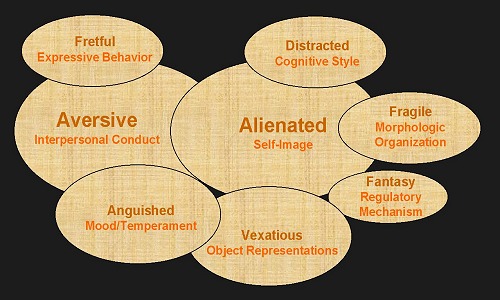Cluster C personality disorder
Cluster C personality disorder:
Cluster C is called the anxious, fearful cluster. It includes the Avoidant, Dependent, and Obsessive-Compulsive Personality Disorders. These three personality disorders share a high level of anxiety.Avoidant personality disorder:
Avoidant personality disorder (AvPD) is a Cluster C personality disorder. Those affected display a pattern of severe social anxiety, social inhibition, feelings of inadequacy and inferiority, extreme sensitivity to negative evaluation, and avoidance of social interactiondespite a strong desire for intimacy. The behavior is usually noticed by early adulthood and occurs in most situations.
People with AvPD often consider themselves to be socially inept or personally unappealing and avoid social interaction for fear of being ridiculed, humiliated, rejected or disliked. They generally avoid becoming involved with others unless they are certain they will be liked. As the name suggests, the main coping mechanism of those with avoidant personality disorder is avoidance of feared stimuli.About two percent of the population, equally divided between the sexes, have this disorder.
Symptoms:
Avoidant individuals often choose jobs of isolation so that they do not have to interact with the public regularly, due to their anxiety and fear of embarrassing themselves in front of others. Some with this disorder may fantasize about idealized, accepting, and affectionate relationships, due to their desire to belong. Individuals with the disorder tend to describe themselves as uneasy, anxious, lonely, unwanted and isolated from others. They often feel themselves unworthy of the relationships they desire, so they shame themselves from ever attempting to begin them.
People with avoidant personality disorder are preoccupied with their own shortcomings and form relationships with others only if they believe they will not be rejected. Loss and social rejection are so painful that these individuals will choose to be alone rather than risk trying to connect with others (see rejection sensitivity). They often view themselves with contempt, while showing an increased inability to identify traits within themselves that are generally considered as positive within their societies.
- Hypersensitivity to rejection and criticism
- Self-imposed social isolation
- Extreme shyness or anxiety in social situations, though the person feels a strong desire for close relationships
- Avoids physical contact because it has been associated with an unpleasant or painful stimulus
- Feelings of inadequacy
- Drastically reduced or absent self-esteem
- Self-loathing, autophobia or self-harm
- Mistrust of others or oneself; exhibits heightened self-doubt
- Emotional distancing related to intimacy
- Highly self-conscious
- Self-critical about their problems relating to others
- Heightened attachment-related anxiety, which may include a fear of abandonmen
- Problems in occupational functioning
- Lonely self-perception, although others may find the relationship with them meaningful
- Feeling inferior to others
- Substance abuse and/or dependence
- In some extreme cases, agoraphobia
- Uses fantasy as a form of escapism to interrupt painful thoughts
Causes:
Researchers today don’t know what causes avoidant personality disorder, though there are many theories, however, about possible causes. Most professionals subscribe to a biopsychosocial model of causation — that is, the causes are likely due to biological and genetic factors, social factors (such as how a person interacts in their early development with their family and friends and other children), and psychological factors (the individual’s personality and temperament, shaped by their environment and learned coping skills to deal with stress). This suggests that no single factor is responsible — rather, it is the complex and likely intertwined nature of all three factors that are important. If a person has this personality disorder, research suggests that there is a slightly increased risk for this disorder to be “passed down” to their children.
Treatment:
Treatment of avoidant personality disorder typically involves psychotherapy with a therapist that has experience in treating this disorder. While some people with a personality disorder may be able to tolerate long-term therapy, most people with such concerns typically go into therapy only when they feel overwhelmed by stress, which usually exacerbates the symptoms of the personality disorder. Such shorter-term therapy will typically focus on the immediate problems in the person’s life, giving them some additional coping skills and tools to help. Once the problem that brought the person into therapy is resolved, a person will typically leave treatment.Medications may also be prescribed to help with specific troubling and debilitating symptoms.

References:
- Avoidant personality disorder:(n.d).Retrieved from: https://en.wikipedia.org/wiki/avoidant-pesonality-disorder.accessed on 11 march 2018
- Psychology today.(n.d).Retrieved from: https://www.psychologytoday.com/conditions/avoidant-personality-disorder.accessed on 11 march 2018
- Psych cenrtal.(n.d).Retrieved from: https://psychcental.com/disorders/avoidant-personality-disorder.accessed on 11 march 2018

Comments
Post a Comment